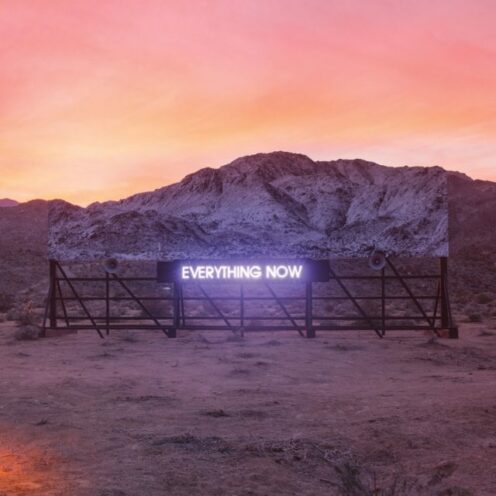Feist have dropped off the Arcade Fire tour after allegations of sexual misconduct against Win Butler. The full message can be found below.
Read More “Feist Drops off Arcade Fire Tour”Win Butler Accused of Sexual Misconduct
Win Butler of Arcade Fire has been accused by multiple women of sexual misconduct:
Numerous people who spoke with Pitchfork in recent months say that Win Butler’s virtuous public reputation is not entirely in line with his offstage behavior. Three women made allegations of sexual interactions with Butler that they came to feel were inappropriate given the gaps in age, power dynamics, and context in which they occurred. All three women were devoted Arcade Fire fans between the ages of 18 and 23 at the start of their interactions with Butler, which took place during overlapping periods from 2016 to 2020, when he was between 36 and 39.
Arcade Fire – “Unconditional I (Lookout Kid)” Video
Arcade Fire have released a video for “Unconditional I (Lookout Kid).”
Read More “Arcade Fire – “Unconditional I (Lookout Kid)” Video”Arcade Fire – “Unconditional I (Lookout Kid)”
Arcade Fire have shared the new song “Unconditional I (Lookout Kid).”
Read More “Arcade Fire – “Unconditional I (Lookout Kid)””Will Butler Leaves Arcade Fire
Will Butler has left Arcade Fire. He wrote this op-ed in The Atlantic last year:
Read More “Will Butler Leaves Arcade Fire”I have another concern that’s hard to shake. After this pandemic year, I’m more aware of the responsibility I have not only to the people who buy tickets, but to the driver making deliveries to the show and to the family of the woman working arena concessions, people who really don’t care about what I’m doing onstage. Vaccination numbers will grow, and the pandemic will end, God willing. I’m not worried about the spread of the coronavirus in particular. But these links of responsibility remain. The analytical part of my brain turns off when touring starts. Before scrambling back to normalcy, I want to make sure that this sense of connection becomes embedded in how I think. I would really love to just be a musician—but I’m also an employer and a player in an industry that has chewed up and spit out plenty of people, especially in this past year.
My hesitations are all about shows, though, not music. Over the past year, I’ve rarely played music with others—a few practices and filmed performances; work on the new Arcade Fire record in November; a handful of Zooms with bandmates to help a school’s PTA fundraiser or support a candidate in the city-comptroller race. But in all of those instances, I’ve experienced an ease, a rightness to the communication—not through the screen with whoever was listening, necessarily, but the people I was playing with. That connection felt restorative, like having a night of deep sleep that repairs parts of yourself you don’t know how to access.
Arcade Fire Announce New Album
Arcade Fire will release We on May 6th. Today they’ve shared a video for “The Lightning, I, II.”
Read More “Arcade Fire Announce New Album”Arcade Fire Share 45-Minute Piece of Music
Arcade Fire have shared a 45-minute piece of music for the Headspace app.
Read More “Arcade Fire Share 45-Minute Piece of Music”Arcade Fire’s ‘Her’ Score Finally Released
Arcade Fire’s score for Her will finally be available on March 19th. It’s now up for pre-order.
Arcade Fire Perform on Colbert
Arcade Fire performed the new song “Generation A” on Colbert last night.
Read More “Arcade Fire Perform on Colbert”Review: Arcade Fire – The Suburbs
When Arcade Fire won the Album of the Year Grammy for The Suburbs on February 13, 2011, it was legitimately shocking. Sure, the Grammys, as an institution, are known for weird out-of-left-field choices, particularly in the Album of the Year category, where the favorites (either odds-wise or in terms of public or critical sentiment) regularly lose to something a bit more sentimental (think Green Day, Usher, Alicia Keys, and Kanye West all losing to the late Ray Charles in 2005) or maybe just a bit more white (Beyonce’s self-titled smash losing to an unexceptional late-career Beck album in 2015). But The Suburbs was different. There was no precedent for an indie band taking the top prize. A band hadn’t won the award period since U2 and Dixie Chicks won back-to-back in 2006 and 2007. The other contenders were also all gargantuan albums that had spawned at least one ubiquitous, generational hit: Katy Petty’s Teenage Dream, Eminem’s Recovery, Lady Gaga’s The Fame Monster, Lady Antebellum’s Need You Now. Arcade Fire weren’t nobodies: they’d made arguably the second most acclaimed album of the 2000s with 2004’s Funeral (the first most acclaimed being Radiohead’s Kid A), and The Suburbs had even debuted at the top of the Billboard 200. But next to a gaggle of mainstream hit machines, the Canadian indie rock band didn’t stand a chance.
Read More “Arcade Fire – The Suburbs”Will Butler – “Surrender” Video
Will Butler of Arcade Fire will release his new album, Generations, on September 25th. Today he’s shared a video for the lead single “Surrender.”
Read More “Will Butler – “Surrender” Video”New Arcade Fire Album in the Works
Win Butler confirmed on Instagram that a new Arcade Fire album is in the works.
Arcade Fire – “Peter Pan” Video
Arcade Fire have released a video for “Peter Pan.”
Arcade Fire – “Chemistry” Video
Arcade Fire have shared a video for “Chemistry.”
Arcade Fire Release “Money + Love” Short Film
Arcade Fire have released a 16-minute short film for “Money + Love.”




